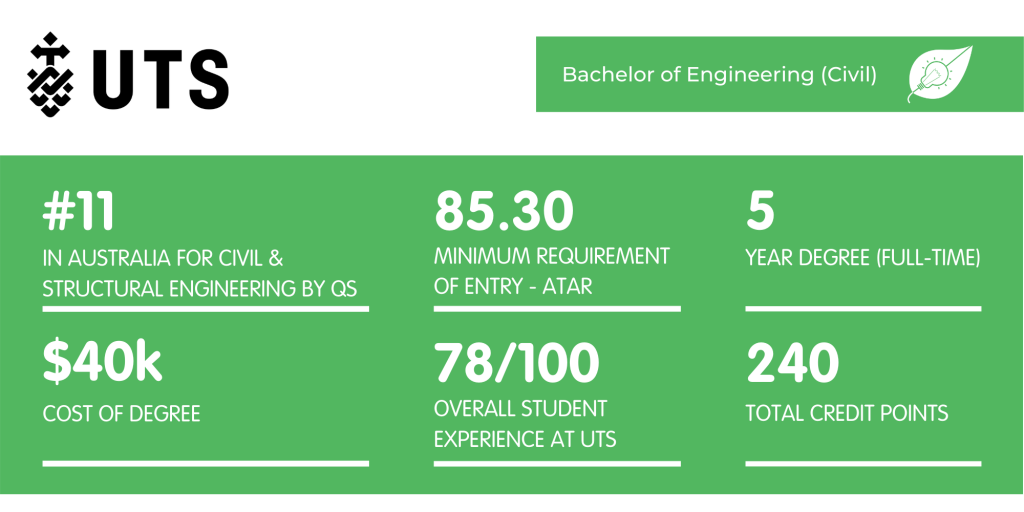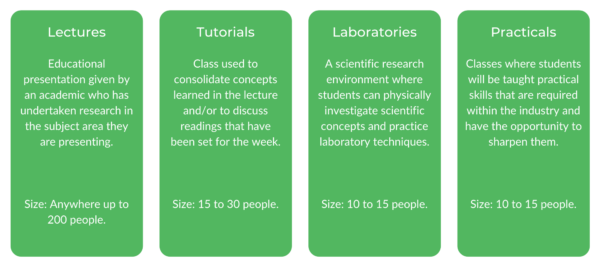
Do you have a keen interest in mathematics and the sciences? If yes, then, UTS Civil Engineering may be the right degree for you!
We’ve got everything you need to know about the degree, including assessments, the class structure, societies you can join and more.
To learn more about this degree and what you’ll learn in the five years of studying Civil Engineering, keep reading on!
What is a Bachelor of Engineering (Civil) at UTS?
Core Units and Majors
How to Get into a Bachelor of Engineering (Civil) at UTS
What’s the Teaching Format?
What’s the Faculty and Culture Like?
What is a Bachelor of Engineering (Civil) at UTS?
So, what’s this degree all about? A Bachelor of Engineering (Civil) at UTS prepares you for a future in the planning, designing, construction and management of all types of structures and infrastructure such as roads, bridges, tunnels and buildings. During the five years of the course, there is a strong focus on mathematics (mainly calculus and trigonometry) and project management.
There are two additional programs that are mandatory when studying a Bachelor of Engineering (Civil) at UTS and to qualify as a professional engineer in Australia. This is the Honours program and a Diploma in Professional Engineering Practice.
Can this degree be studied in conjunction with another?
Potential students can also combine a Bachelor of Engineering (Civil) with particular degrees and graduate with a double degree. These degrees are:
-
- Bachelor of Science
- Bachelor of Science Diploma in Professional Engineering Practice
- Bachelor of Medical Science
- Bachelor of Medical Science Diploma in Professional Engineering Practice
- Bachelor of Business
- Bachelor of Business Diploma in Professional Engineering Practice
- Bachelor of Arts in International Studies
- Bachelor of Arts in International Studies Diploma in Professional Engineering Practice
- Bachelor of Creative Intelligence and Innovation
- Bachelor of Laws
What are the career options after studying Civil Engineering?
The best bet for finding a job with a completed degree is, of course, becoming a civil engineer. However, your chosen area will vary depending on the chosen specialisation of civil engineering. These include:
-
- Water, waste, soil and energy industries
- Project management
- Energy
- Mining
- Civil/Infrastructure
- Conservation and natural resource management
Core Units and Majors
Regardless of your major and specialisation, there are eight core subjects in a Bachelor of Engineering at UTS. These are:
Physical Modelling introduces all first-year students to the fundamentals of principles and natural processes such as mechanics, thermal physics, electricity and waves. It is a laboratory-focused subject that has a strong foundation in mathematics and modelling natural phenomenons.
Focusing on teamwork and collaboration, Engineering Communication is a UTS subject that partners with the Engineers Without Borders (EWB). Students work in a group to design a solution relating to a real-life engineering project set by EWB.
What can you specialise in?
The three specialisations in a Bachelor of Engineering (Civil) at UTS are construction, structures and civil.
The Construction specialisation focuses on the design and construction of large projects. Think high-rise apartments and office blocks. The specialisation is more about the communicative and leadership part of the degree, such as the management of projects and sites.
The Structures specialisation leans more to the design and modelling aspects of the Civil Engineering major. It develops the student’s skills in the analysis and design of large, complex structures such as the Sydney Opera House and Sydney Harbour Bridge.
In a Civil specialisation, students study a predetermined combination of subjects from the construction and structures stream. Rather than focusing on a specific area, students get a more general understanding of civil engineering.
Are there built-in internships?
Yes, there are! With the compulsory study of the Diploma in Professional Engineering Practice, all engineering students attend two 6-month internships to ensure that graduates have a competitive skill-set when entering the workforce.
The first internship ideally takes place in the second semester of the second year, when students have accumulated just under 87 credit points. The second internship typically occurs in the second semester of the fourth year.
Don’t fear! There will be a preparatory subject in which students will learn how to apply for internships as well as about workplace professionalism. While the internships must be registered with the UTS Career Department and Hub, students must find and apply for these experiences independently.
How to Get into a Bachelor of Engineering (Civil) at UTS
Commonly, the eligibility into this course is through reaching the ATAR cut-off. The ATAR cut-off for a Bachelor of Engineering (Civil) at UTS is 85.30.
If your ATAR does not meet the cut-off, there are some alternatives for you. First, check the Year 12 Adjustment Factors scheme to see if you have been awarded extra points towards your ATAR, based on your performance on HSC subjects that are relevant to your course.
Students are advised to complete the Year 12 Engineering and IT Questionnaire to demonstrate their motivations for studying their degree. This can assist with your application if your ATAR falls short of the cut-off by up to three points.
Alternatively, you may choose to study a Diploma of Engineering through UTS College. This allows you to get into the second year of a Bachelor of Engineering and continue your studies from there! Depending on your choice of workload, a Diploma of Engineering lasts 8, 12 or 16 months.
Assessments
Although there are no additional assessments, commencing students must take the mathematics readiness survey to determine their most suitable first-year mathematics subject.
Assumed Knowledge
When studying for a Bachelor of Engineering (Civil) at UTS, there is assumed knowledge for the course. These include HSC Mathematics Extension 1, Physics and English Standard. Chemistry is recommended for Civil Engineering majors, but it is not assumed.
Scholarships
You might consider applying for certain scholarships if you have been accepted into a Bachelor of Engineering (Civil) at UTS.
For people with demonstrated financial disadvantage, look into the Vice-Chancellor’s Merit Scholarship and the Vice-Chancellor’s Outstanding Achievement Scholarship. For people who identify as female, look into the FEIT Women in Engineering and IT Scholarship.
What’s the Teaching Format?
A Bachelor of Engineering (Civil) at UTS is taught through lectures, tutorials, practicals and laboratories. And fortunately, the course runs in semesters rather than trimesters!
Class Structure

Lectures
The majority of the subjects have a weekly lecture that is around 60 to 120 minutes. These lectures are more general and explain the content assessed in the subject.
You’ll find that there can be up to 200 people attending, but they are usually recorded and supported by class notes so you can view them online.
Tutorials
The tutorials are also around 60 to 90 minutes and have from 15 to 30 people. Tutorial sessions provide the opportunity to apply lecture content to different scenarios and problems, as well as to prepare the student for practicals.
Commonly, tutorials will simulate a workplace problem, and in teams, students are expected to design a solution.
Laboratories
These laboratory sessions come up in more science-based subjects of the course. These classes are hands-on where you can test out materials, conduct experiments and interpret the data from the experiments.
Labs usually have about 10 to 15 people attending and go on for approximately 60 to 90 minutes.
Practicals
Like laboratory sessions, practicals are hands-on classes and will come up in more engineering-based subjects. Practicals help familiarise the students with using equipment correctly through demonstration and first-hand experience.
They are approximately 60 to 120 minutes long and typically have around 10 to 15 people.

How much time do you spend on campus?
The contact hours for a Bachelor of Engineering (Civil) at UTS is around 12 to 15 hours. The standard engineering student spends at least 3 days a week on classes. But, depending on how classes are spread on the timetable, it can go up to 5 days.
What are the assessments like?
A Bachelor of Engineering (Civil) at UTS requires a variety of mathematical, scientific and communicative knowledge. So, students have different types of assessments depending on the subject.
For more science-based subjects, you can expect to be assessed on your laboratory sessions, reports and final exams. Engineering-based subjects focus on online quizzes, both individual and group reports, and group projects. In particular subjects, such as Math Modelling and Physical Modelling, you’ll only have hand-in assignments!
In the last year of a Bachelor of Engineering (Civil), students complete a Capstone project that is based on an engineering project of their choice. Students are expected to conduct rigorous research and are supported by an academic supervisor.
What are the skills you refine and learn?

A Bachelor of Engineering (Civil) at UTS develops the problem-solving, mathematical and communication skills of a student.
As future civil engineers, problem-solving skills encompass the ability to design a solution for both real-life and simulated problems. This includes the research and analysis of the project using the theories from science and engineering.
Mathematical skills are fundamental to civil engineering students, who are expected to oversee projects in structure and infrastructure. Here, students are expected to shape up in their calculus and trigonometry.
Communication between project teammates is an essential skill learned in UTS Civil Engineering. From the start of the degree, students will develop their knowledge of how to actively and respectfully participate in their projects. This supports their transition to the workplace, where they may even take up a leadership role.
What’s the Faculty and Culture Like?
UTS Civil Engineering is a part of the Engineering and Information Technology Faculty. This is a large and dependable faculty that definitely has a warm sense of community!
If you want to build a strong network and support system, there are several societies that you may join while studying a Bachelor of Engineering (Civil) at UTS.
UTS Engineering Society (EngSoc)
This is one of the largest societies at UTS, where students get the opportunity to make friends, build industry connections and participate in both social and academic activities. Some events include networking events, fundraisers and even trivia nights!
Engineers Without Borders (EWB)
While being a small society, EWB can be an opportunity to diversify your career options in the area of humanitarian and sustainable-focused projects. It offers industry nights, volunteering workshops and more social activities such as movie and inter-uni Kahoot nights.
Women in Engineering and IT
For students identifying as female, this society will allow you to meet other female students in the Engineering and IT faculty as a space for empowerment, friendship and career networking.
Support Programs
If you ever feel behind in your degree, there may be relevant U:PASS (Peer Assisted Study Success) sessions that may help you bump up your marks. In these sessions, you will have the chance to talk to and be taught by U:PASS leaders, who are trained senior students who have performed well in the subject.
Interested in the pros and cons of this degree? Check out our article here!
Lynn Chen is a Content Writer at Art of Smart Education and is a Communication student at UTS with a major in Creative Writing. Lynn’s articles have been published in Vertigo, The Comma, and Shut Up and Go. In her spare time, she also writes poetry.


